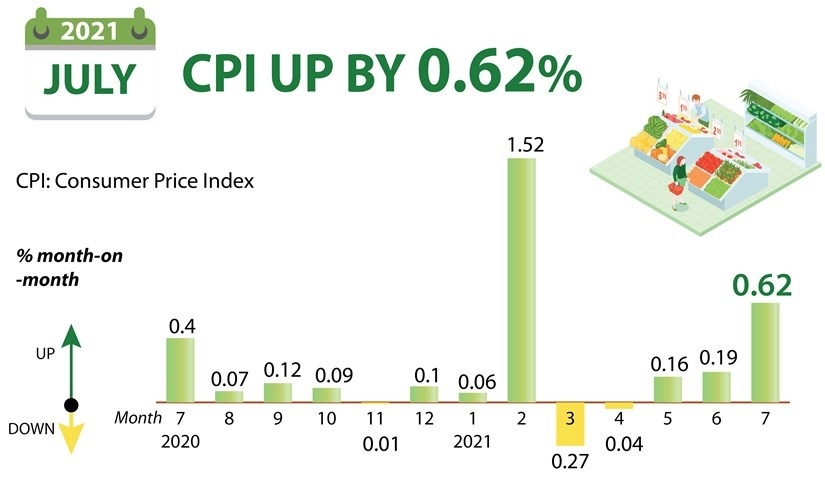Pandemic measures placing strain on inflation goals
 |
| July 2021. Source: VNA |
According to the General Statistics Office (GSO), the consumer price index (CPI) in the first seven months of 2021 rose by 1.64 per cent over the same period last year, the lowest increase since 2016.
The CPI in July only increased by 0.62 per cent on-month, showing that the waves of people hoarding goods did not have much impact on this important index. In consumer goods and services, seven out of groups increased their prices, while three groups saw price decreases, and one remained stable compared to the previous month.
The slow increase in Vietnam’s CPI is directly attributable to the prices of petrol following global prices. The GSO’s report showed that the traffic group had the highest price increase in July with 2.36 per cent, causing the general CPI to increase by 0.23 percentage points.
Core inflation, which is the change in the costs of goods and services but does not include those from the food and energy sectors, in July and the first seven months of 2021 compared to the same period last year were the lowest since 2011, and decreased by 0.06 per cent in July compared to the previous month thanks to price stabilisation solutions in the whole market. On average, core inflation climbed 0.89 per cent over the same period in 2020 in the first seven months of 2021, lower than the overall average CPI, which increased by 1.64 per cent.
Meanwhile, the foreign currency reserves of the State Bank of Vietnam still ensure to meet the needs of importing enterprises, also affecting the price of gold which averaged at $1,803 per ounce, down 1.78 per cent in June
Price pressure is growing throughout Vietnam’s economy as businesses struggle more to meet consumer demand amid shortages in raw materials and labour. In addition, limited transport capabilities due to anti-pandemic measures in some localities, together with higher input costs, are also causing issues for businesses trying to maintain production and exports.
Consumer demand will likely increase when Vietnam’s ongoing vaccination programme makes further significant progress, and restrictions on travel are eased, along with government support packages.
GDP growth in the first half of the year reached 5.64 per cent. Standard Chartered Bank predicted that the economy may recover slightly in 2021. However, food prices increased after cooling down last year, an opposite trend compared to the previous year, paired with recent low core inflation rate. Standard Chartered warned that rising food prices are a risk that could put pressure on inflation because the food group accounts for nearly 40 per cent of the goods in the CPI baskets.
Pham The Anh, chief economist of the Vietnam Institute for Economic and Policy Research, found that inflationary pressure is increasing, especially in recent months when the consumer market was recovering.
According to Anh, pressure on inflation may come from strong money supply growth. In the last 10 years, the growth rate of cash and credit supply remained very high compared to regional countries, similar to the growth of the economy.
The recovery of consumer demand may increase inflationary pressure into 2022, said Anh. “This recovery comes from two main factors. Firstly, price appreciation of real estate and stocks may spread to consumer prices, especially post-pandemic. Secondly, recovery of the global economy will cause price hikes for all kinds of raw materials, higher than the average level of 2020,” he explained.
What the stars mean:
★ Poor ★ ★ Promising ★★★ Good ★★★★ Very good ★★★★★ Exceptional
Related Contents
Latest News
More News
- State corporations poised to drive 2026 growth (February 03, 2026 | 13:58)
- Why high-tech talent will define Vietnam’s growth (February 02, 2026 | 10:47)
- FMCG resilience amid varying storms (February 02, 2026 | 10:00)
- Customs reforms strengthen business confidence, support trade growth (February 01, 2026 | 08:20)
- Vietnam and US to launch sixth trade negotiation round (January 30, 2026 | 15:19)
- Digital publishing emerges as key growth driver in Vietnam (January 30, 2026 | 10:59)
- EVN signs key contract for Tri An hydropower expansion (January 30, 2026 | 10:57)
- Vietnam to lead trade growth in ASEAN (January 29, 2026 | 15:08)
- Carlsberg Vietnam delivers Lunar New Year support in central region (January 28, 2026 | 17:19)
- TikTok penalised $35,000 in Vietnam for consumer protection violations (January 28, 2026 | 17:15)

 Tag:
Tag:




















 Mobile Version
Mobile Version